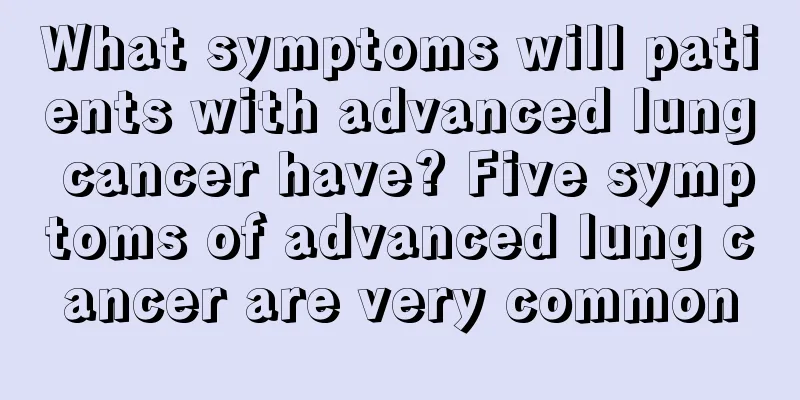How should lung cancer be treated better? Several treatments for lung cancer

|
After examination and diagnosis, it was found that the patient had lung cancer. Generally speaking, once patients hear that they have cancer, most of them still find it difficult to face the disease with a positive attitude and take treatment seriously. Coupled with the psychological pressure, they may give up treatment. In fact, the treatment of lung cancer is still very effective and can delay the patient's condition and prolong life to a large extent. There are many treatments for lung cancer, mainly three main treatment measures. Chemotherapy (I) Chemotherapy for small cell lung cancer Due to the biological characteristics of small cell lung cancer, it is generally recognized that chemotherapy should be the first choice except for a few patients with sufficient evidence showing no intrathoracic lymph node metastasis. 1. Indications (1) Patients with small cell lung cancer confirmed by pathology or cytology; (2) Patients with KS scores of 50-60 points or more; (3) Patients with an expected survival time of more than one month; (4) Patients ≤70 years old. 2. Contraindications (1) Elderly patients or cachexia; (2) Patients with severe heart, liver and kidney dysfunction; (3) Patients with poor bone marrow function, white blood cell count below 3×10^9/L and platelet count below 80×10^9/L (direct count); (4) Patients with complications and infection, fever and bleeding tendency, etc. (II) Chemotherapy for non-small cell lung cancer Although there are many effective drugs for non-small cell lung cancer, the efficacy is low and complete remission is rarely achieved. 1. Indications: (1) Patients with stage III disease confirmed by pathology or cytology to have squamous cell carcinoma, adenocarcinoma or large cell carcinoma who cannot undergo surgery, and patients with postoperative recurrence and metastasis or stage III disease who are not suitable for surgery for other reasons; (2) Patients with the following conditions after surgical exploration and pathological examination: ① residual lesions; ② intrathoracic lymph node metastasis; ③ cancer thrombi in lymphatic vessels or thrombi; ④ poorly differentiated cancer; (3) Patients with pleural or pericardial effusion need local chemotherapy. 2. Contraindications: Same as small cell carcinoma. Radiation therapy (I) Treatment principles Radiotherapy is the best for small cell carcinoma, followed by squamous cell carcinoma, and the worst for adenocarcinoma. However, small cell carcinoma is prone to metastasis, so large-area irregular irradiation is often used. The irradiation area should include the primary lesion, the supraclavicular area on both sides of the mediastinum, and even the liver and brain, and should be supplemented with drug therapy. Squamous cell carcinoma is moderately sensitive to radiation, and the lesions are mainly local invasions, and metastasis is relatively slow, so radical treatment is often used. Adenocarcinoma is less sensitive to radiation and is prone to blood metastasis, so simple radiotherapy is rarely used. (ii) There are many radiation complications, which may even cause partial functional loss; for patients with advanced tumors, the effect of radiotherapy is not perfect. At the same time, patients with poor physical condition and older age are not suitable for radiotherapy. (III) Indications for radiotherapy are divided into radical treatment, palliative treatment, preoperative radiotherapy, postoperative radiotherapy and intracavitary radiotherapy according to the purpose of treatment. Radical treatment 1. Surgical treatment; 2. Palliative treatment; 3. Preoperative radiotherapy; 4. Postoperative radiotherapy; 5. Intracavitary short-distance radiotherapy. There are three treatment methods for lung cancer. The surgical treatment of lung cancer is generally surgical resection, and there are still many things to pay attention to during the surgery. The principle of surgical resection is: completely remove the primary lesion and the lymph nodes in the chest that may metastasize, and preserve normal lung tissue as much as possible. Pneumonectomy should be performed with caution. 1. Local resection: refers to wedge-shaped cancer block resection and lung segment resection. For patients with very small primary cancer, the elderly and the weak, with poor lung function or well-differentiated cancer with low malignancy, local lung resection can be considered; 2. Lobectomy: For isolated peripheral lung cancer, limited to one lobe without obvious lymph node enlargement, lobectomy can be performed. If the tumor involves two lobes or the middle bronchus, the upper middle lobe or lower middle lobe lung resection can be performed; 3. Sleeve lobectomy: This procedure is mostly used for lung cancer in the upper and middle lobes of the right lung. If the tumor is located in the lobar bronchus and involves the opening of the lobar bronchus, sleeve lobectomy can be performed; 4. Pneumonectomy: When the lesion is extensive and the lesion cannot be removed by the above methods, pneumonectomy can be carefully considered; 5. Carina resection and reconstruction: When the tumor exceeds the main bronchus and involves the carina or the lateral wall of the trachea but does not exceed 2cm: ① Carina resection and reconstruction or sleeve pneumonectomy can be performed; ② If one lobe of the lung is still retained, try to retain it. The surgical procedure can be determined according to the situation at the time. Take lung cancer treatment seriously, but surgery is often just physical treatment, ignoring the psychological treatment of patients. In fact, both are equally important. It is necessary to use good and appropriate treatment methods to remove lung cancer lesions, and also to enlighten patients psychologically and cooperate with disease treatment optimistically, which can often achieve good treatment results and complete the repair of the lungs. |
>>: How to effectively prevent lung cancer? These 6 tips are enough to prevent lung cancer
Recommend
How many teeth does a normal person have
Children usually grow deciduous teeth about 6 mon...
Where can I get accurate breast cancer pathology examination
Breast cancer is a common disease in our lives. I...
What to eat for prostate cancer? 7 recommended anti-prostate cancer diets
American researchers recently found that prostate...
What is the reason for sudden blood in the stool
I believe everyone will be shocked when they see ...
Hypokalemia causes arrhythmia, take care of your body and treat it early
Potassium is an indispensable trace element for o...
Is it okay to soak your feet during the day?
It is okay to soak your feet during the day, espe...
Is there any way to improve a flat forehead
If a person has regular facial features but a fla...
What are the benefits of soaking your feet in ginger and pepper water?
The majority of middle-aged and elderly people ha...
How to clean the dust on the screen window?
As we all know, screens are tools used to prevent...
What are the benefits of drinking honey and vinegar on an empty stomach in the morning?
Honey water is something containing sugar. Many p...
Symptoms of mild degenerative changes in the lumbar spine
There are mild degenerative changes in the lumbar...
What are the nursing measures for liver cancer
Liver cancer care is very important. It directly ...
How to choose a hospital for fibroid surgery
How to choose a hospital for fibroid surgery? Fib...
6 incredible health secrets
There are always some bad habits in life that you...
Top 10 Jiangxi specialties that can be taken away
When talking about Jiangxi, many people will thin...









